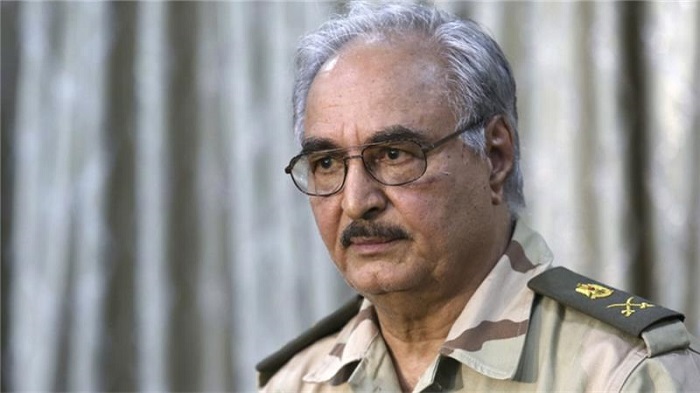Leaked tapes suggest Western support for Libyan general - TOP SECRET

The leaked tapes appear to confirm an earlier report by the same publication on the existence of a joint operations base assisting General Khalifa Haftar in his pursuit to take back eastern Libya from groups he has labelled as "extremists".
In the recordings passed on to MEE from the Benina airbase, one of Haftar`s most vital military facilities, pilots and air traffic controllers speak in both Arabic and English, with American, British, French and Italian accents.
The leaked tapes could prove harmful to the operation room`s international members, as Haftar has refused to support the unity government in Tripoli, which is backed by the United Nations.
Forces loyal to the general have also been accused of battling with groups taking part in the western-backed campaign against the Islamic State of Iraq and the Levant (ISIL, also known as ISIS).
“Benghazi, good morning, Ascot 9908,” says a man with a British accent in one of the recordings. “Ascot 9908, just letting you know we are in contact with Benghazi airfield.”
Operators speaking with French and Italian accents appear to be directing air traffic from the control room in most of the recordings.
Pilots with American accents also feature throughout the tape, using the call signals "Bronco 71" and "Mustang 99" - both are names of classic American cars.
Many of the files sound like routine air traffic control room communications – back-and-forth confirmations, call signs, and malfunctioning radios.
Foreign backing
General Haftar, a part of the Libyan political scene for nearly four decades, was once a key figure in Muammar Gaddafi`s army before being exiled to the US in the late 80s. He spent the next several decades plotting to oust the Libyan leader.
After participating in the Libyan revolution in 2011 and Gaddafi`s overthrow, he faded into the background until February 2014, when he called on Libyans to rise up against the General National Congress (GNC) - the newly elected parliament.
At the time of Haftar`s dramatic televised address, groups like the al-Qaeda affiliate Ansar al-Sharia had taken over Libya`s second city of Benghazi and its surrounding towns and villages, mounting a bloody campaign against military, police and public officials.
In May 2014, he launched Operation Dignity to combat what he called the hardline militias in and around Benghazi. And in March 2015, Libya`s newly elected House of Representatives (HoR), which replaced the GNC, appointed him the commander of the Libyan National Army.
In the last two years, forces loyal to Haftar have had major success in pushing armed groups out of Benghazi to as far as Derna, 250km to the city`s east.
But Haftar`s potential role in any future national military has been one of the largest road blocks in attempts to achieve Libyan unity.
He is reportedly unhappy with the line-up of the UN-brokered Government of National Accord because the security cabinet has been given to another officer, ibrahim al-Barghathi.
There have been numerous reports since the beginning of Operation Beginning that Hafter receives considerable support from foreign backers, the UAE and Egypt in particular.
Some analysts say that Haftar`s foreign backing has made him less willing to compromise on a unity government.
“Support by western special forces, particularly French, to General Haftar has made it more difficult to reach a compromise with him because he thinks he has important external backing and therefore does not need to compromise with the unity government,” Libya specialist Mattia Toaldo, a senior policy fellow with the European Council on Foreign Relations, told MEE.
Now, as the UN-backed government attempts to route ISIL out of its stronghold in Sirte, Haftar has been accused of pursuing a separate war against the same group that helped push ISIL out of Derna just last year.
The Shura Council of Mujahideen in Derna - an anti-ISIL Islamist coaltion - was essential in last year`s fight in Derna. The UN Support Mission in Libya has condemned Haftar`s air strikes on Derna and warned that the resulting civilian casualties could constitute a war crime.
According to Toaldo, Haftar`s attempts to destory other anti-ISIL groups is nothing new.
"Basically he doesn’t want to have any rivals in the east and he considers everyone, even loosely associated with political Islam, as terrorists,” Toaldo said. “Much like his Egyptian patrons.”















































